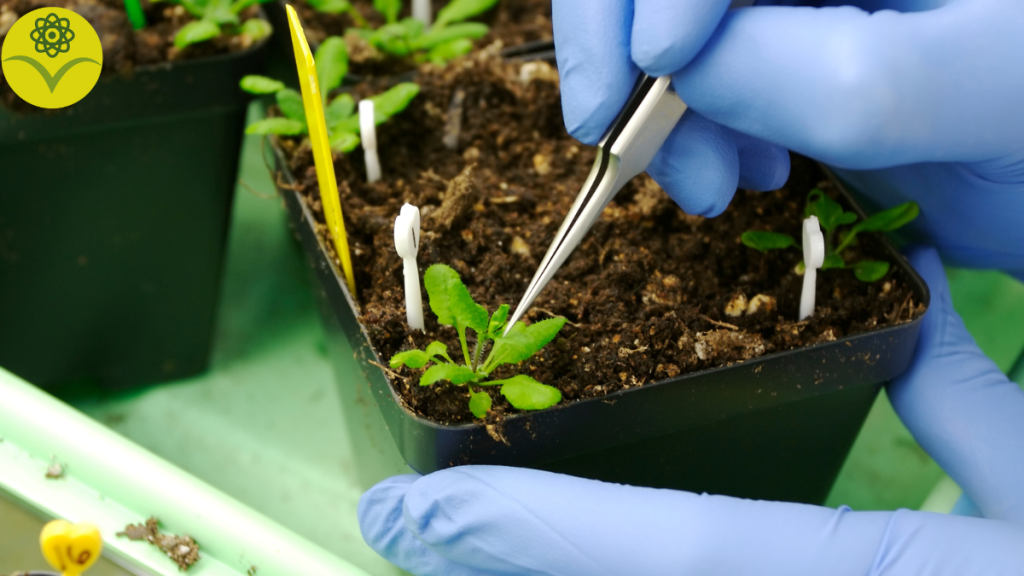In the ever-evolving world of biotechnology, genetic engineering stands as a powerful tool for agriculture with the potential to revolutionize food production.
By directly modifying the DNA of crops, scientists can create plants that are more resistant to pests, diseases, and environmental stresses, thereby increasing yield and reducing the need for chemical inputs.
However, as with any powerful technology, genetic engineering raises ethical concerns that cannot be ignored.
This article delves into the benefits and controversies surrounding genetically modified (GM) crops, offering a balanced perspective on this complex issue.
The Benefits of Genetically Modified Crops
Increased Crop Yields and Food Security
One of the most significant advantages of GM crops is their ability to increase agricultural productivity.
By engineering crops to be more resistant to :
- Pests
- Diseases
- Environmental challenges such as drought
Farmers can achieve higher yields on the same amount of land.
This is particularly important in regions where food insecurity is a pressing issue, as it can contribute to more stable food supplies.
Reduced Reliance on Chemical Pesticides and Herbicides
Traditional agriculture often relies heavily on chemical pesticides and herbicides to protect crops from pests and weeds.

However, these chemicals can have detrimental effects on the environment, including soil degradation, water contamination, and harm to non-target species such as bees.
GM crops that are engineered to be pest-resistant or herbicide-tolerant can reduce the need for these chemicals, leading to more sustainable farming practices.
Enhanced Nutritional Content
Beyond yield and environmental benefits, genetic engineering can also be used to enhance the nutritional content of crops.
For example, biofortified crops such as Golden Rice, which is engineered to produce beta-carotene (a precursor to vitamin A), aim to address nutritional deficiencies in populations that rely heavily on rice as a staple food.
Adaptation to Climate Change
Climate change poses a significant threat to global agriculture, with more frequent and severe weather events, shifting growing seasons, and increased pressure from pests and diseases.
GM crops can be designed to withstand these challenges, helping to ensure that food production remains stable in a changing climate.
The Controversies Surrounding Genetically Modified Crops
Environmental Concerns
While GM crops can reduce the need for chemical inputs, they also raise concerns about unintended environmental consequences.
For example, the widespread adoption of herbicide-tolerant crops has led to the overuse of certain herbicides, resulting in the emergence of herbicide-resistant “superweeds“.
Additionally, there is concern about the potential for gene flow from GM crops to wild relatives, which could disrupt local ecosystems.

Health and Safety
The safety of GM crops for human consumption is another area of debate.
While numerous scientific studies have found that GM crops are safe to eat, some members of the public remain skeptical.
Concerns range from the potential for allergic reactions to the long-term health effects of consuming genetically modified organisms (GMOs).
Transparency and rigorous testing are essential to address these concerns and build public trust.
Corporate Control and Food Sovereignty
The commercialization of GM crops is often dominated by a few large biotech companies, raising concerns about corporate control over the food supply.
Critics argue that this concentration of power can undermine food sovereignty, particularly in developing countries where farmers may become dependent on patented seeds and the associated agrochemicals.
This dynamic can exacerbate inequalities and limit the ability of local communities to make decisions about their food systems.
Ethical Considerations and Public Perception
At the heart of the debate over GM crops are ethical questions about the extent to which humans should intervene in nature.

For some, the idea of altering the genetic makeup of plants is inherently troubling, while others view it as a natural extension of centuries-old agricultural practices such as selective breeding.
Public perception is further shaped by cultural, social, and religious beliefs, making it a complex and often polarized issue.
Addressing Public Concerns: Pathways to a Sustainable Future
Enhanced Transparency and Public Engagement
Building public trust in GM crops requires greater transparency from both scientists and corporations.
This includes :
- Clear labeling of GM products
- Open communication about the risks and benefits
- Active engagement with communities to address their concerns

Public participation in decision-making processes can also help ensure that the development and deployment of GM crops align with societal values.
Strengthening Regulatory Frameworks
Robust regulatory frameworks are essential to ensure the safety and environmental sustainability of GM crops.
This includes rigorous testing for potential health and environmental impacts, as well as ongoing monitoring once GM crops are commercialized.
International cooperation is also crucial, as the global nature of agriculture means that the decisions made in one country can have far-reaching consequences.
Promoting Diverse and Inclusive Approaches to Agriculture
While GM crops offer significant benefits, they are not the only solution to the challenges facing global agriculture.
Promoting a diverse array of farming practices, including organic and agroecological approaches, can help create more resilient food systems.
Supporting smallholder farmers and protecting indigenous knowledge and practices are also critical to ensuring that agricultural innovations are inclusive and equitable.
Fostering Ethical Research and Innovation
As genetic engineering continues to advance, ethical considerations must guide research and innovation.
This includes addressing the potential social and environmental impacts of new technologies, as well as ensuring that the benefits of genetic engineering are shared broadly.
Multidisciplinary collaborations between scientists, ethicists, policymakers, and communities can help navigate the complex ethical landscape of agricultural biotechnology.
Conclusion
The ethical implications of genetic engineering in agriculture are multifaceted and require careful consideration.
While GM crops offer significant benefits in terms of increased productivity, reduced chemical use, and enhanced nutrition, they also raise important questions about environmental sustainability, health and safety, corporate control, and the role of technology in shaping our food systems.
By fostering transparency, strengthening regulations, promoting diverse approaches, and prioritizing ethical research, we can work towards a future where genetic engineering contributes to a more sustainable and equitable global food system.
Learn more about Ethical Issues Related to Genetically Modified Organisms and Dairy Farming Technology Innovations.

